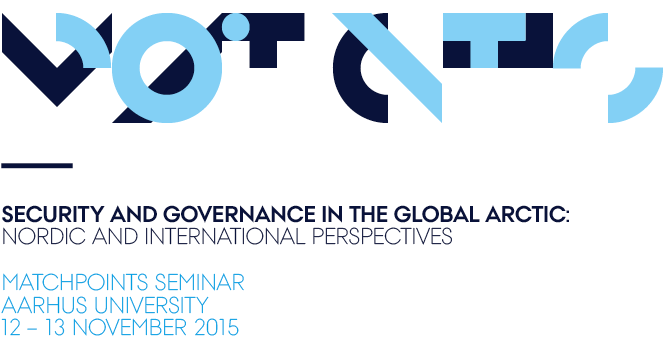"Aarhus Matchpoint conference, Security and Governance in the Global Arctic: Nordic and International Perspectives", will be held in Aarhus next 12-13 November 2015.

The purpose of the conference is to provide a forum for policy-makers and academics to deliberate on how the security, resilience and sustainability of the globalized Arctic region and its peoples may be enhanced, and what instruments of governance may most suitably contribute. The conference will spell out (1) how the different relevant dimensions of security (military, economic, environmental, energy and human security) manifest themselves in the governing / governance arrangements in the Arctic; (2) how the challenges associated with each manifest themselves, individually and together; and (3) what forms of governing arrangements can best help to address the challenges. The conference will also focus on (4) how the Nordic countries and nations, including Greenland, the Faroe Islands and Aaland Islands, may contribute to the peace, stability and prosperity of the Arctic region through collaborative efforts based on their shared social, human, environmental and democratic values.
Ellen Margrethe Basse and Cécile Pelaudeix on behalf of Arctic Research Centre, Aarhus University, are organizing the panel on "ENERGY SECURITY AND ENVIRONMENTAL GOVERNANCE".
A call is now open to submit papers (deadline 15 June 2015) on:
The increase in global energy demand, and the evolving politico-socio-economic contexts of Arctic countries are all factors (re) stimulating economic development in the energy sector: hydrocarbons resources (oil and gas), but also rare earth elements or uranium. Resource extraction is impacting the natural environment and the small-scale societies of the Arctic. National and regional governments therefore face crucial governance issues.
The session will in priority address the following questions:
- What is the rationale for the development of resource extraction in the various Arctic regions/states?
- How to compare the national environmental regulations in the Arctic related to energy resources extraction?
- How do national energy strategies accommodate regional and local needs?
- Which actors are involved in the setting of environmental standards and what are their relative powers?
- How does the EU contribute to the development of standards related to environmental protection?
- To what extent does international legal framework impact national regulations applicable in the Arctic? Conversely, to what extent local, regional and national regulations have an impact on international law?
- How to assess the evolution of public policies in the use of local renewable energy in Arctic communities?
Keynote speaker: Dr. Petra Dolata, Associate Professor, University of Calgary
The session welcomes contributions from political science, international relations, law and economics.
Open for 3 sessions.
Submit your paper to Ellen Margrethe Basse or Cécile Pelaudeix
More information here.
